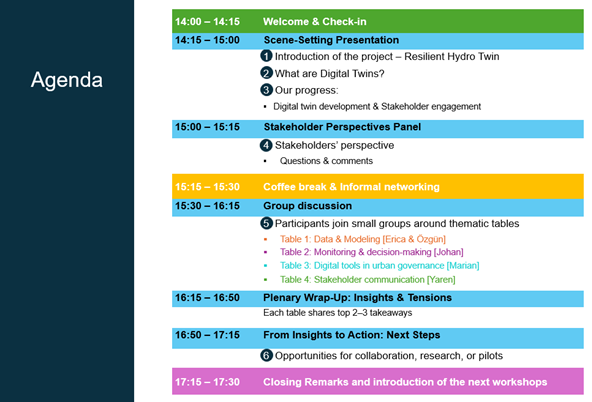On 23 June 2025, the first stakeholder workshop of the ResilientHydroTwin project was successfully held at TU Delft, with hybrid participation from over 30 stakeholders across academia, government, and practice.
The event brought policymakers, researchers, and water management experts from a diverse range of institutions: the Municipality of Rotterdam, Rijkswaterstaat, Hoogheemraadschap van Delfland, Deltares, IHE Delft, TU Delft, Eindhoven University of Technology, Erasmus University Rotterdam, Leiden University, University of Twente, and Indian Institute of Technology–Madras.


[Workshop Agenda]

[Group discussion]
Following a presentation introducing our project team, the key concepts behind Digital Twins (DT), and current progress in both technical development and stakeholder engagement, participants were divided into four groups to discuss three guiding questions:
Q1. What are the current challenges you face in your work related to urban resilience and water management?
Q2. Where do you see opportunities for Digital Twins (DTs) to add value in your context—or where might they fall short?
Q3. What key elements are missing for Digital Twins to work effectively in practice?


[Takeaways from group discussions]
Top 10 cross-group keywords:
- Trust: A recurring concern in all groups: trust in data, in models, in institutions, and in inter-organizational collaboration.
- Data quality & availability: All groups emphasized challenges related to inconsistent, inaccessible, or fragmented data.
- Ownership & responsibility: Key for both data and Digital Twin (DT) systems. Unclear roles hinder adoption and accountability.
- Visualization: Highlighted as a critical tool for communication, stakeholder engagement, and scenario understanding.
- Uncertainty: Addressing, communicating, and managing uncertainty was a cross-cutting theme, especially in decision-making.
- Interdisciplinary collaboration: Every group touched on the need to bridge silos between sectors, disciplines, and levels of government.
- Communication: Challenges in language, framing, and expectations emerged frequently, especially in stakeholder interaction.
- Scenario planning: Seen as one of the most valuable use cases for DTs, especially in preparedness and long-term strategy.
- End-users usability: Discussions emphasized that DTs must be designed with users in mind – practicality, clarity, and accessibility matter.
- Governance framework: Institutional frameworks, political alignment, and ethical oversight were all flagged as essential for making DTs effective and sustainable.
[Upcoming Workshops]
This workshop is the first in a series of stakeholder engagement events under the project. The planned following workshops include
- October 2025: Stakeholder Integration Strategy – Vision, Voice, Visualization
- February 2026: Community Engagement and Participatory Approach
- June 2026: Governance Framework Establishment
Interested in contributing to the next sessions? Feel free to contact us for collaboration.
[Workshop Slides]
You can view the full slide deck presented during the event here:
https://surfdrive.surf.nl/files/index.php/s/Ac6lcCgcIjK6vV9
Special thanks to our particpants from Municipality of Rotterdam, Rijkswaterstaat, Hoogheemraadschap van Delfland, Deltares, IHE Delft, TU Delft, Eindhoven University of Technology, Erasmus University Rotterdam, Leiden University, University of Twente, and Indian Institute of Technology–Madras.
If you have any questions or suggestions, please contact Dr. Zhaowen Liu (z.liu-8@tudelft.nl).


Add comment
Comments